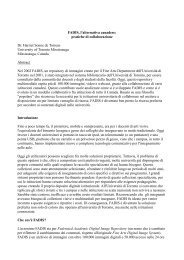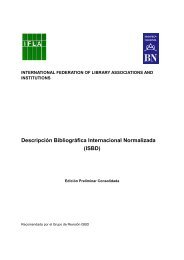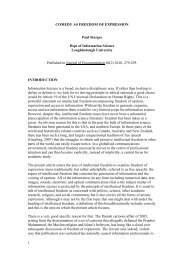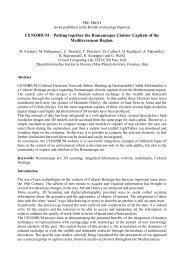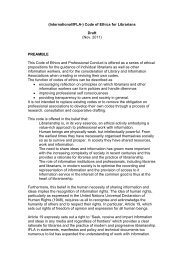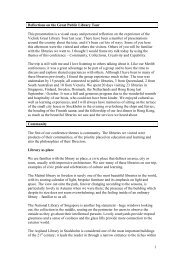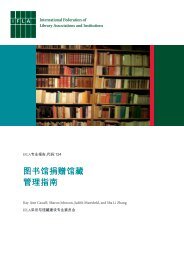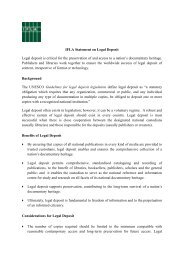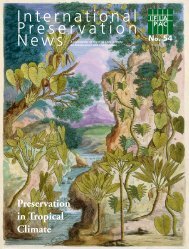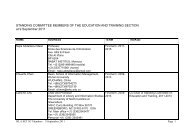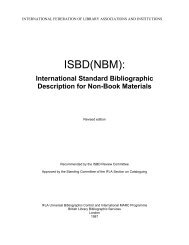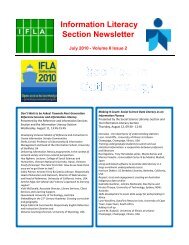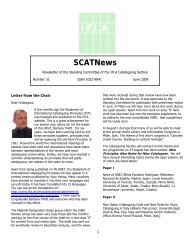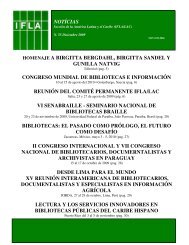English - IFLA
English - IFLA
English - IFLA
You also want an ePaper? Increase the reach of your titles
YUMPU automatically turns print PDFs into web optimized ePapers that Google loves.
<strong>IFLA</strong>/LAC NEWSLETTER N.56 JUNE 2010<br />
communication, which ultimately characterize the<br />
globalization process.<br />
In such a way that what defines the knowledge economy is the<br />
use of knowledge as key to generate, or rather create, value<br />
and wealth by changing knowledge into information.<br />
Knowledge is definitely much more than mere information, but<br />
the latter is its vehicle for participation in the products and<br />
services in whose process of creation or transformation it is<br />
involved. In this context, it easy to see the important role that<br />
play the libraries in the knowledge economy. The huge volume<br />
of information that is produced in the so-called information<br />
society, coupled with the use of new technological tools in the<br />
library activities and services, end up breaking the geographic<br />
boundaries and limits for for the access to information. This is<br />
known as globalization.<br />
Thus we have before us a new challenge for librarians, who are<br />
forced to review the role they play and readjust their functions<br />
according to the needs of the new environment of the society.<br />
You cannot ignore that the society new material base, applied<br />
to production, is structured by the electronic-digital computer.<br />
Therefore, the purpose of this meeting is to discuss and outline<br />
the role and profile of the professional who will develop and<br />
deliver library services in the information society and in the<br />
knowledge society, according to the specific needs of different<br />
types of libraries in Latin America and the Caribbean.<br />
Moreover, we should consider not only the issue of librarian<br />
education in relation to the current needs but also the skills<br />
that are required so that anyone can successfully work in the<br />
information society,<br />
I warmly welcome the distinguished international participants<br />
who have joined us, representatives of Mexico, Colombia,<br />
Peru, Paraguay, Argentina, Cuba, Puerto Rico, Spain and<br />
Brazil. I appreciate your presence at this meeting of the<br />
Standing Committee of the International Federation of<br />
Library Associations and Institutions Section for Latin<br />
America and the Caribbean, which will surely reach well<br />
beyond the outlined goals. The issues to be addressed relate to<br />
the many activities carried out by the Federation in the regional<br />
context to make significant progress in each of the 105<br />
different types of information units providing library services.<br />
The titles of some of the topics featured in the working agenda<br />
arouse great interest and show concern for the problems faced<br />
in the region. Examples of such topics include "Internet<br />
Manifesto in Latin America," "Open access to knowledge -<br />
promoting sustainable development" and about the earthquakes<br />
in the fraternal countries of Haiti and Chile. We want to<br />
express our strong interest in one of the activities announced<br />
for 2011, namely "Libraries beyond libraries; integration,<br />
innovation and information for everybody."<br />
For the University of Panama, especially for the Library<br />
System, this event represents a recognition of the good work<br />
done by their staff, so I congratulate them; as well as the<br />
furtherance of future actions that will, as always, be supported<br />
by our administration, for the benefit of local, national and<br />
regional communities.<br />
Thank you.<br />
Dr. Gustavo García de Paredes<br />
Rector de la Universidad de Panamá<br />
PERU<br />
Evaluation and impact of the <strong>IFLA</strong>/FAIFE<br />
workshops as a training tool for trainees within<br />
the scope of the <strong>IFLA</strong>/UNESCO Internet<br />
Manifesto Guidelines<br />
Phase III of the workshop was held on October 22-23, 2009, in<br />
the city of Cusco. Twelve librarians attended the workshop<br />
representing: the Municipality of Santiago de Surco de Lima,<br />
Peruvian North American Cultural Center of Arequipa,<br />
Catholic University of Santo Toribio de Mogrovejo de<br />
Lambayeque, Davy College of Cajamarca, Universidad<br />
Privada del Norte de la Libertad, North American Peruvian<br />
Cultural Institute of Huancayo, National University of Jorge<br />
Basadre of Tacna, Universidad Peruana Unión de Juliaca,<br />
Puno, Research Institute of the Peruvian Amazon IIAP,<br />
Universidad Nacional Daniel Alcides Carrión in Cerro de<br />
Pasco, and The National Library System of the National<br />
Library.<br />
Attendees of this assessment and impact workshop included Dr<br />
Stuart Hamilton, <strong>IFLA</strong> Senior Advisor; Loida Garcia-Febo,<br />
<strong>IFLA</strong>/FAIFE Secretary; Felipe Martinez, Chair of <strong>IFLA</strong>/LAC.<br />
Workshop's objective was to examine the effects of the<br />
workshops delivered between March and October. Participants<br />
reported on the activities carried out in their regions. The<br />
assessment was done in the format of personal and group<br />
interviews designed to discuss the first steps in the<br />
implementation of the manifesto in Peru.<br />
The reports were very good. Each region had a story to share.<br />
The Arequipa case was largely commented, for those who<br />
worked with Internet cafes, with librarians in the province<br />
universities, who met for the first time to discuss the<br />
manifesto. The most striking experience was that of the<br />
Amazon, who arrived in several villages accompanied by a<br />
group of actors who would every morning read the manifestos<br />
aloud, prompting the interest of the local media and bringing<br />
the Internet to a village for the first time.<br />
(Doris Ivon Samanéz Alzamora, SC <strong>IFLA</strong>/LAC)<br />
24



